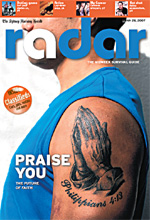In today’s SMH there is a story on Mary Mackillop, and a curious story about a blessing of mobile phones.
What’s most interesting is that both stories have a positive ‘feel’ to them.
There is nothing about scandal or infighting.
In fact, the story about Mary Mackillop has no sense of scepticism whatsoever. It reads like the thing you’d expect to find in a Catholic newspaper.
Here’s the main teaser quote, as featured on the front page of smh.com.au this morning:
When Kathleen Evans arrives at the pearly gates, she will have a simple question for St Peter: ”Why me?”
Maybe the secular media is waking up to the fact that far more Australians consider themselves Christians than had previously conceded by the mainstream press.
Keep praying for opportunities to use these articles as a springboard to conversations with your friends about Jesus.
And, if you’re a budding journo, why not submit an opinion piece to the dailies, and see if they might publish it?


